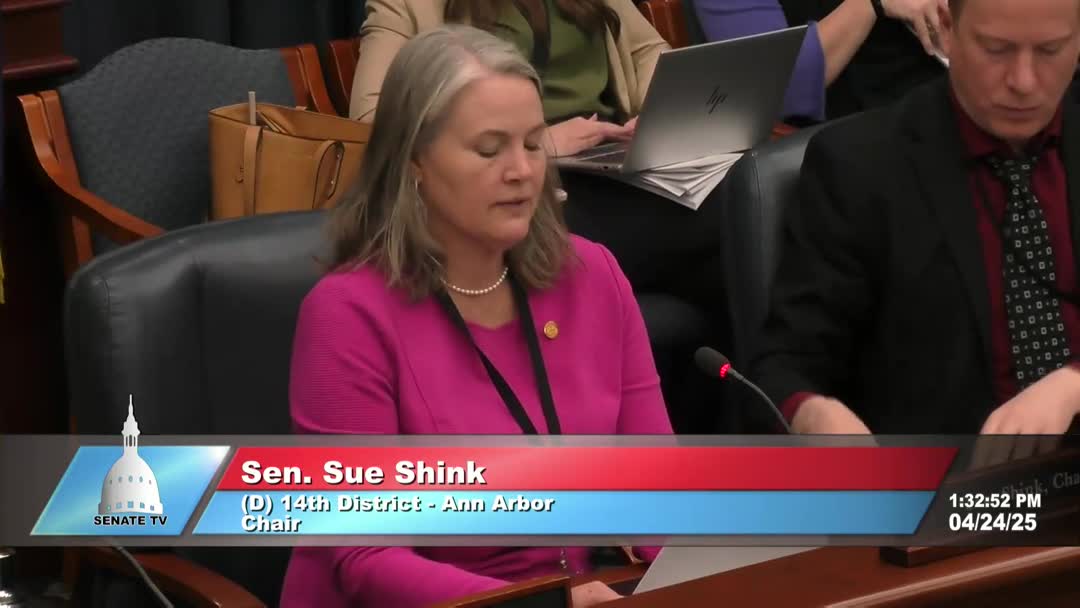Subcommittee adopts SB169 S1, recommends $2.25 billion corrections budget with new one-time projects and policy language
Get AI-powered insights, summaries, and transcripts
Subscribe
Summary
The Senate Appropriations Subcommittee on Corrections and Judiciary on April (meeting date not specified) voted to adopt Senate Bill 169 S1 and reported the measure to the Senate Committee on Appropriations. The chair's recommendation for the Department of Corrections would appropriate $2,254,778,600 for fiscal year 2025-26, a net general fund increase the subcommittee recorded as $94,500,000.
The Senate Appropriations Subcommittee on Corrections and Judiciary on April (meeting date not specified) voted to adopt Senate Bill 169 S1 and reported the measure to the Senate Committee on Appropriations. The chair's recommendation for the Department of Corrections would appropriate $2,254,778,600 for fiscal year 2025-26, a net general fund increase the subcommittee recorded as $94,500,000.
The subcommittee chair and fiscal staff said the package combines baseline adjustments, new ongoing programs and a series of one-time work projects. Senate fiscal analyst Joe Grosco summarized the corrections recommendation: "This bill will spend a total of $2,254,778,600 in total, for fiscal year 26," and described new policy and reporting changes in the bill.
Why it matters: the bill funds operations for the state corrections system and includes both recurring and one-time investments that affect retirement participation for corrections staff, transitional housing for people leaving incarceration, county jail reimbursements and several contracted or community provider grants.
Key elements and discussion
- Spending totals and general fund: Grosco told the subcommittee the total appropriation in the bill is $2,254,778,600 and that the general fund portion in the presentation represents a $94,500,000 increase for fiscal 2025-26.
- Pension change: The package includes $31,000,000 tied to recently passed pension changes that would allow certain corrections officers and other staff to join the state police retirement system (a hybrid defined-contribution/defined-benefit plan). Grosco said that amount is not exclusive to corrections and also supports other agencies affected by the pension change.
- Transitional housing: The bill moves a governor-proposed transitional housing development project from one-time to ongoing funding. The subcommittee's package shifts $5,000,000 from each of two lines (offender success services and residential probation diversion) to pay for the transitional housing proposal (two $5,000,000 reductions as presented).
- County jail reimbursements and visitation language: The subcommittee added two items to raise county jail per diems (items 11 and 12) and to increase reimbursement for prosecutorial and detainer expenses by $20. During questions, Senator Aultman asked whether facilities that do not offer in-person visitation qualify for the per diem; Senate fiscal analyst Joe Grosco replied that the bill contains boilerplate language requiring in-person visitation but does not, as drafted in the subcommittee presentation, specify a penalty withholding funds beyond that requirement: "There's boilerplate language in the bill that that does exactly that," Grosco said. Grosco later clarified the language in the bill "specifically does not say that" funds would be withheld as a penalty.
- Policy and reporting changes: The bill adds or modifies boilerplate reporting and policy sections cited by Grosco, including changes to critical incident reporting (requirement for a follow-up summary when an investigation occurs and, if there is a death, the official cause of death), a modification to strip-search procedures and an exemption that would allow legislators to be exempt from a 72-hour visitation rule in an internal policy directive.
- One-time work projects and community funding: The subcommittee included one-time restricted funds ($15,000,000) to use remaining work-project balances from 2021 projects, designated for rail-safety improvements in the decision document, as well as one-time grants: $1,000,000 to Goodwill ("Flip the Script" expansion outside Detroit), $1,000,000 for peer recovery coaches, $500,000 for Brighter A Brighter Way, and $100,000 for Eastern Michigan University. The subcommittee also proposed a $500,000 general-fund line to work on reducing medical co-payments for people in custody.
Votes and formal actions
- Motion to adopt Senate Bill 169 (S1) and report to the Senate Committee on Appropriations: moved by Senator Santana and supported by Senator Irwin. The subcommittee recorded the S1 vote in the transcript as "3 yays and 1 nay," after a roll call the clerk read that included Senator Schenck (Yes) and Senator Santana (Yes); the transcript indicates the substitute S1 was adopted. The subcommittee then voted to report SB169 S1 to the Senate Committee on Appropriations; the clerk's roll call for that report was recorded in the transcript and the subcommittee chair stated "The SB 169 is reported to the full Appropriations Committee."
Discussion vs. decision
- Discussion: Fiscal staff provided line-item descriptions, policy and boilerplate changes, and answered questions about the county jail visitation language and funding sources.
- Decision/direction: The subcommittee adopted the S1 substitute and voted to report SB169 S1 to the Senate Committee on Appropriations.
What remains unclear from the transcript
- The transcript presentation included some inconsistent spellings and sequencing (for example, the decision document reference to the wrong work projects that staff said would be corrected in the online version). The transcript does not provide a single, clean roll-call record for every individual vote for SB169 that allows unambiguous assignment of yes/no to every named member; the subcommittee chair's roll-call announcements and final tallies are recorded in summary form.
Next steps and context
SB169 S1 was sent to the full Senate Appropriations Committee for further consideration. The subcommittee discussion folded in governor and legislative adjustments and combined ongoing funding changes with one-time work-project spending.
